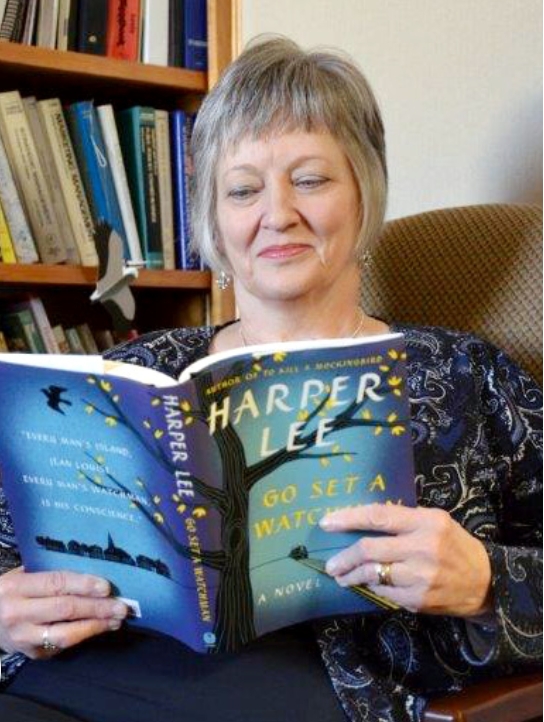Rumors swirl around Lee’s second book
Marilyn Joiner
Marilyn Joiner is an avid reader and marketing executive who lives and works in Shreveport. The next book she has chosen to read is a nonfiction companion to Lee’s books, “The Mockingbird Next Door” by Marja Mills, which is a journalist’s memoir of her friendship with Harper Lee and her sister.
“Go Set A Watchman”
by Harper Lee
Thomas Wolfe wrote “You Can’t Go Home Again.” Perhaps Harper Lee should have written, “You Shouldn’t Go Home Again.” As a child grows and matures – away from the influences of home – the child becomes an adult living in a world of new experiences and ideas. This is the case with the protagonist of “Go Set a Watchman.”
Jean Louise Finch is the adult version of Scout, the young girl in the beloved American classic by Harper Lee, “To Kill a Mockingbird.” Her homecoming is as much revelation as it is connection. She arrives on a train from New York City, bringing her back to Maycomb, Ala., to check on her aging father.
Readers recall young Scout and the widowed Atticus, defender of Tom Robinson, a black man accused of raping a white woman and see the idealized version of the South. Powerful attorney steps forward to support a man wrongly accused. Mockingbird equals idealism, what is right about humanity.
Jean Louise arrives expecting home to be as she remembers it, but she encounters multiple situations that no longer fit those childhood perceptions. Anyone who grew up during the turbulent era of the 1950s and 1960s will recall the images painted in “Watchman.” They are real and raw. Lee tells it like it was. Were there open and gracious people who welcomed blacks in capacities other than servants or laborers? Yes, but that was not the norm in places where Jim Crow-era laws extended into the mid-1960s, separate but equal yet rarely equal.
Jean Louise in her 20s now sees flaws in society and flaws in people, including her father and her would-be fiancé. Her watchman (or conscience) guides her as she watches and sees the rust on the iron gods.
The title appears early, setting the theme. Taken from a passage in Isaiah (21:6), it is read by the Methodist minister, Mr. Stone, during a church service:
“For thus hath the Lord said to me, Go, set a watchman, let him declare what he seeth.”
The book is written as reverie as Jean Louise recalls the past while living in the present of the 1950s. Her past life fights her new-found reality in Maycomb and may not be fully appreciated by those outside the South. However, those of us who lived through these turbulent times in the region understand that much of the raw language and ugly past were, indeed, reality. So for me, this book was as much nonfiction as fiction.
“Go Tell a Watchman” is one of the most heralded books of recent history, a second novel by the reclusive yet acclaimed author of “Mockingbird.” It set records at Barnes & Noble and Amazon.com. Everyone wanted to know more about what I consider to be a feel-good fairytale. But not all were happy to see it published. Consider just a few objections leveled against the book:
Lee never wanted it published.
Rubbish! She submitted it to a publisher, and it was rejected. If it can be published now and give the 89-yearold author additional financial security in her assisted living reality, that’s fine.
Lee may have been manipulated.
There is no way to know, and we can’t blame the book for that.
Some have complained about the prose and dialect. It’s not a problem for me and speaks to its authenticity. This is a life she lived and knew. I find the language beautiful and the prose wellcrafted.
It was never edited. I don’t buy that.
Every writer pores over manuscripts multiple times and usually shares them with those they respect. Perhaps a big city editor never edited it, but that’s fine with me. I’ve read many unedited manuscripts. This is not one of those.
Atticus is flawed. Yes. He is human. He is flawed. It’s hard to learn everything about a person in one short novel. This gives more insight into a man and how he – and many others – reacted at the time. I enjoyed many novels with characters I didn’t like but found interesting.
“Mockingbird” shows an idealized life and is the kind of book an Eastern editor encouraged Lee to write. “Watchman” is real and raw with language and scenes, some painful to recall. Perhaps each was the right book for its era.
Read on:
Each month CityLife will feature a book review from a local voice in the community. If you would like to share a favorite book, email editor@ theforumnews.com.